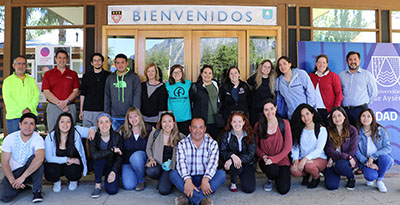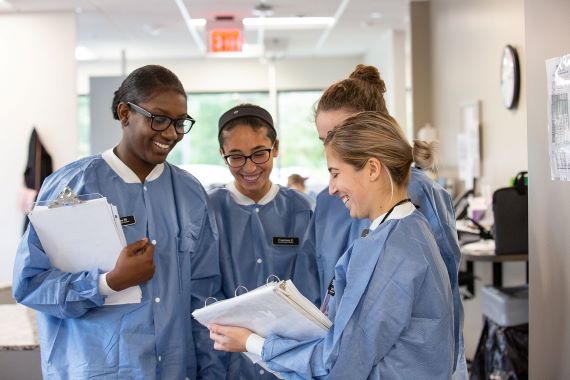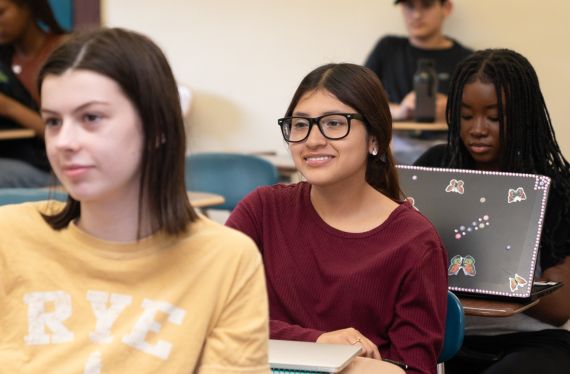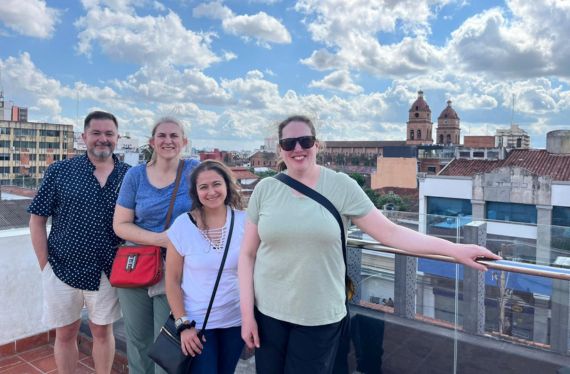Funding supports new exchange program to address global health concerns
 Regis College announced today that it has started two international partnerships to develop global health initiatives in Argentina, Chile and the United States. The partnerships are funded by $50,000 in the latest 100,000 Strong in the Americas Innovation Fund competition.
Regis College announced today that it has started two international partnerships to develop global health initiatives in Argentina, Chile and the United States. The partnerships are funded by $50,000 in the latest 100,000 Strong in the Americas Innovation Fund competition.
“This grant enables the university to implement new academic exchange programs that enrich our campus with students from diverse populations while also supporting our strategic plan to increase Regis’ visibility on an global scale,” said Regis President Antoinette Hays, PhD, RN. “Regis is proud to welcome these students, a majority of whom have never left their home country.”
Partnering with Johnson and Wales University and Universidad de Congreso in Argentina, Regis will develop a new exchange program designed to address global health concerns. Through experiential and service-oriented community engagement activities, cultural experiences, industry-led trainings and faculty-led lectures in the U.S. and Argentina, students will explore the regional impact and issues surrounding health and nutrition that affect local populations, such as food availability, preparation, sanitation, and security.
The funding will also support a study abroad program at Regis for health sciences students from Universidad de Aysén in Chile to learn about the social factors that impact public health issues and differences in healthcare solutions between Chile and America. This is the first northbound study abroad program for Universidad de Aysén.
“MetLife Foundation recognizes the vital role study abroad programs play in helping students enhance technical skills while developing valuable cross-cultural skills and experience,” said Dennis White, president and CEO of MetLife Foundation. “We are pleased to support a second round of partnerships between higher education institutions across the Americas and extend the benefits of study abroad to more students.”
About 100,000 Strong in the Americas Innovation Fund
The 100,000 Strong in the Americas Innovation Fund is the public-private sector collaboration between the U.S. Department of State, U.S. Embassies, Partners of the Americas, NAFSA, corporations, and foundations working together to stimulate new higher education partnerships between the United States and the rest of the Western Hemisphere.
The central, trusted mechanism to support this hemispheric-wide education initiative of the Bureau of the Western Hemisphere Affairs at the U.S. Department of State is the Innovation Fund, that builds bridges of connectivity, enhances institutional capacity, increases student exchanges, and strengthens regional education cooperation throughout the Americas.
Since its inception in January 2014, the Innovation Fund has awarded 187 grants to 350 teams of universities and colleges in 25 countries and in 42 U.S. states. Currently, over 1,800 higher education institutions have joined the Innovation Network - with 1,000 universities and colleges in the United States.
The mission of Partners of the Americas is to connect people and organizations across borders to serve and to change lives through lasting partnerships. These partnerships create opportunity, foster understanding, and solve real-life problems. Inspired by President Kennedy and founded in 1964, under the Alliance for Progress, Partners is a non-profit, non-partisan organization with international offices in Washington, D.C. Twitter: @partnersamerica.
With 10,000 members worldwide, NAFSA: Association of International Educators is the largest non-profit professional association dedicated to international education program and policy. Learn more: Connecting Our World or via Twitter @NAFSA and @ConnectOurWorld.
About Metlife Foundation
MetLife Foundation was created in 1976 to continue MetLife’s long tradition of corporate contributions and community involvement. Since its founding through the end of 2017, MetLife Foundation has provided more than $783 million in grants and $70 million in program-related investments to organizations addressing issues that have a positive impact in their communities. In 2013, the Foundation committed $200 million to financial inclusion, and our work to date has reached more than six million low-income individuals in 42 countries.


